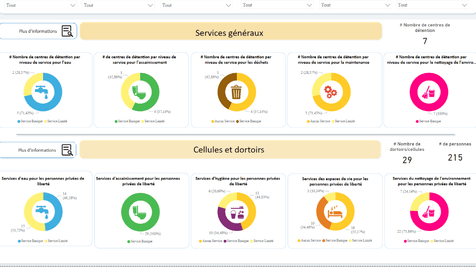Assessing sanitary conditions in detention centers

Prison environment at the center of concerns
Through its Access to justice program, Terre des hommes works with the staff teams of detention centers and with training institutions for justice professionals to alleviate the negative impact that deprivation of liberty has on children and young people. The ultimate goal is to reduce violence and to lower recidivism, but also to ensure that young people in custody are treated with dignity and well prepared for their reintegration, an effort that is in line with the foundation’s Vision 2030.
Terre de hommes’ Vision 2030 defined access to justice as one of its highest priorities. One of the objectives of the Access to justice program is to work with authorities and staff teams in detention centers around the world to ensure that girls and boys are treated with dignity and are being prepared for reintegration.
Tdh delegations in the field – particularly in Africa, South America and the Middle East – have identified the implementation of water, sanitation and hygiene (WASH) activities in detention centers as a major challenge due to a lack of resources and technical tools adapted to the specificities of these institutions.
The objective of the collaboration between our teams was therefore to develop, test and disseminate a set of standardized tools to evaluate the sanitary conditions of people living in detention, and in particular to measure the different levels of service related to access to water, hygiene, sanitation, waste treatment, maintenance and cleanliness of the prison environment.
While Terre des hommes designed the different surveys, the associated indicators based on internationally recognized minimum health recommendations (ICRC, UNOPS, WHO as well as the UN rules for the care of prisoners) and their calculation methods, CartONG was responsible for the development of the digital tools: configuration and implementation of the survey via KoBoToolbox, and then configuration of a dashboard to visualize the indicators via PowerBI.
CartONG and Terre des hommes, a long-standing partnership
CartONG and Terre des hommes have been collaborating since 2013 on many issues related to Mobile Data Collection (MDC) and, more generally, to Information Management. CartONG is the main support partner of Tdh in regards to Mobile Data Collection activities and has been strongly involved in the development of FACET WinS (schools) and WiH (healthcare facilities) – jointly developed with the Swiss Federal Institute of Aquatic Science and Technology (Eawag).
FACET is a mobile application allowing the assessment of sanitary conditions (EHA/WASH) in public institutions. It is a simple, adapted and ready-to-use tool through mobile data collection that can be carried out online/offline on an open source platform. The data can then be easily analyzed via dedicated pre-configured tools (FACET Analyser or PowerBi) allowing a standardized visualization of the results. FACET is a dynamic tool that adapts to the needs of humanitarian actors and to the evolution of international standards.
Deliverables and milestones
CartONG created for its partner two surveys in XLSForm format in order to deploy them on a compatible MDC server – KoBoToolbox for this project. Our teams were also responsible for developing a PowerBI (PBIX) dashboard, which was then configured on the deployed surveys. The survey questions and the dashboard were developed in 3 languages: French, English and Spanish, so that they can be used in various contexts. Tdh also hopes to create an Arabic version in the near future. Finally, a user’s guide has been compiled to explain to Tdh teams how best to use these two tools independently.
After its school and healthcare facility versions, FACET is now available for use in detention centers. Existing nowhere else, this innovative and free access tool will improve the knowledge of sanitary conditions in places of detention and guide the interventions of Tdh and the entire humanitarian community. Thanks to CartONG’s technical support, FACET WinD is now 100% digitalized from data collection to analysis, making it much easier to use.
– Tdh EHA Department
The collaboration between our teams during this project consisted of 5 key steps:
- Initiation phase: At the beginning of the project, the CartONG team exchanged a lot with Tdh to understand existing issues, the indicators and their specific needs in terms of the tools to be developed.
- Encoding of surveys: CartONG encoded the surveys in XLSForm format, and deployed them on the KoBoToolbox platform in Ecuador, the country where the pilot project was initiated.
- Pilot project in Ecuador: A first pilot data collection was carried out in March by the Terre des hommes teams in Ecuador in order to test the survey and to collect data to configure the data visualization tool. This allowed CartONG to make the necessary adjustments to the proposed data collection tool.
- Dashboard development on PowerBI desktop: The dashboard was developed using mainly data from the pilot project in Ecuador. Throughout the process, numerous exchanges with the Tdh teams were carried out to ensure that the tools developed corresponded to the needs mentioned.
- Finalization of the tools: Following the test in Ecuador, CartONG finalized the collection and visualization tools, as well as the user guide so that these tools can be deployed by Terre des hommes on other missions.

The partnership between CartONG and Tdh continues, our teams will keep on supporting Tdh, both at headquarters and in the field, on their requests related to Mobile Data Collection and Information Management. Three support missions, in Moldova, Romania and Hungary, were organized in August 2022 to accompany Tdh’s regional response to the Ukrainian crisis in the area of M&E data management – that is to say data specifically related to Monitoring & Evaluation processes.